University that Opens Doors to Global Labour Market: Graduates in High Demand among Employers
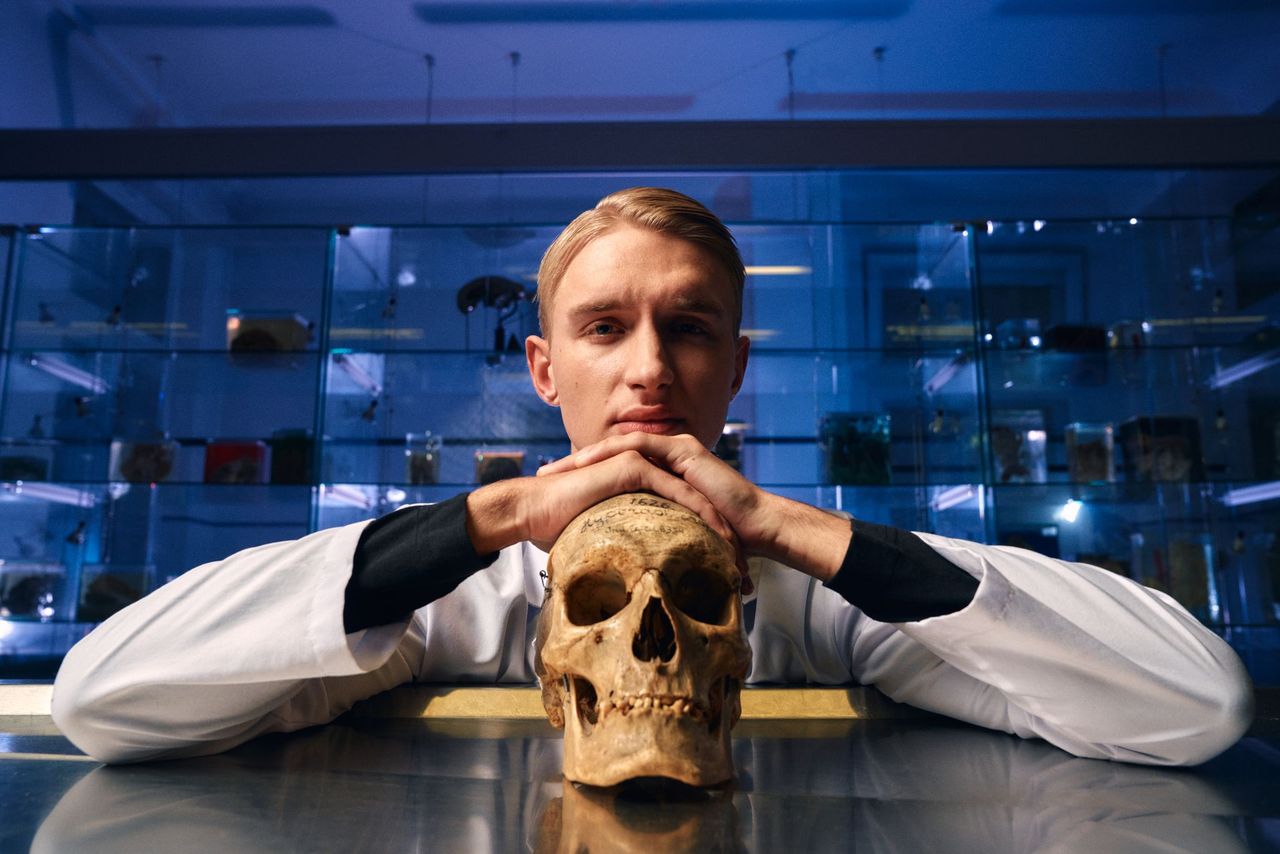
The Lithuanian University of Health Sciences (LSMU) maintains its leading position among the strongest and leading universities in the country. Over the past year, both LSMU as a whole and individual areas of its activities have been repeatedly put to very serious “tests”.
The assessments given by international expert groups are excellent. LSMU has been accredited for the maximum period and has been the undisputed leader in medical and health sciences in Lithuania. Starting this year, the LSMU Diploma of Medical Studies is recognized globally.
The internationally recognized excellence of LSMU’s scientific achievements has a direct impact on the quality of studies: all studies at LSMU are based on the latest scientific knowledge. Majority of its study programmes have been accredited for the maximum period. Some degree programmes delivered at LSMU, such as the Veterinary Medicine degree programme, have achieved a high level of specialty recognition in Europe.
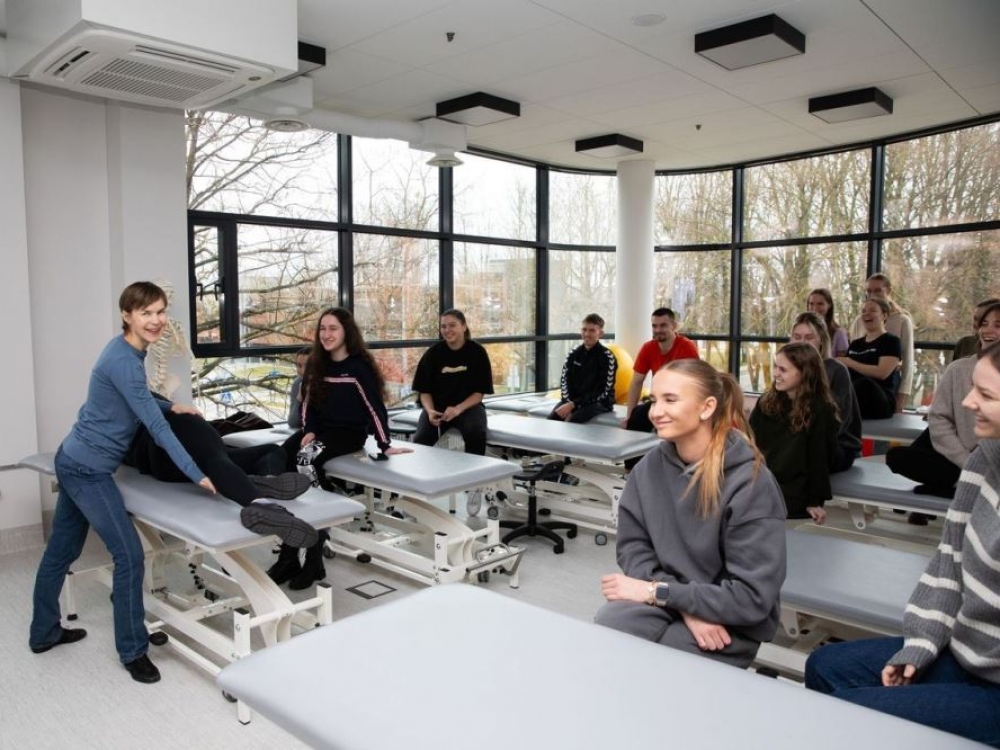
Despite the unfavourable demographic situation, the University maintains a stable number of students. The number of foreign students has recently increased significantly, with nearly 27% of them now studying in Lithuania. Having obtained globally recognised qualifications as a medical doctor, LSMU graduates will be able to sit the USMLE exams without restrictions and, if successful, pursue a career in the U.S. This path and opportunity is aspired by many young people.
Lithuanian graduates also find studying at LSMU attractive: an increasing number of those invited to study at LSMU are making it their first choice.
Over the last decade, LSMU has been making heavy investments in high-quality educational and research infrastructure. More modern research and study centres are also in the pipeline, giving students ample opportunities for internships, clinical skills development, early involvement in research activities, and the opportunity to work with the latest equipment and technologies.
The value of the knowledge and skills provided by the University is reflected in this year’s LSMU motto: “Power to Change”.
Science-based studies
The fundamental principle of LSMU is the unity of academic, scientific and clinical practice. Close cooperation between the University, Kaunas Clinics and the LSMU Kaunas Hospital enables LSMU to train specialists, lecturers and researchers of the highest international profile, to carry out research and experimental development, to develop innovations, and to successfully implement and apply their results in clinical practice.
Students also benefit, as the study process is constantly updated in the light of scientific discoveries and technological innovations emerging from research and business projects. Talent development does not end with a Bachelor’s or Master’s degree. Every year, dozens of young people choose the path of a researcher at LSMU.
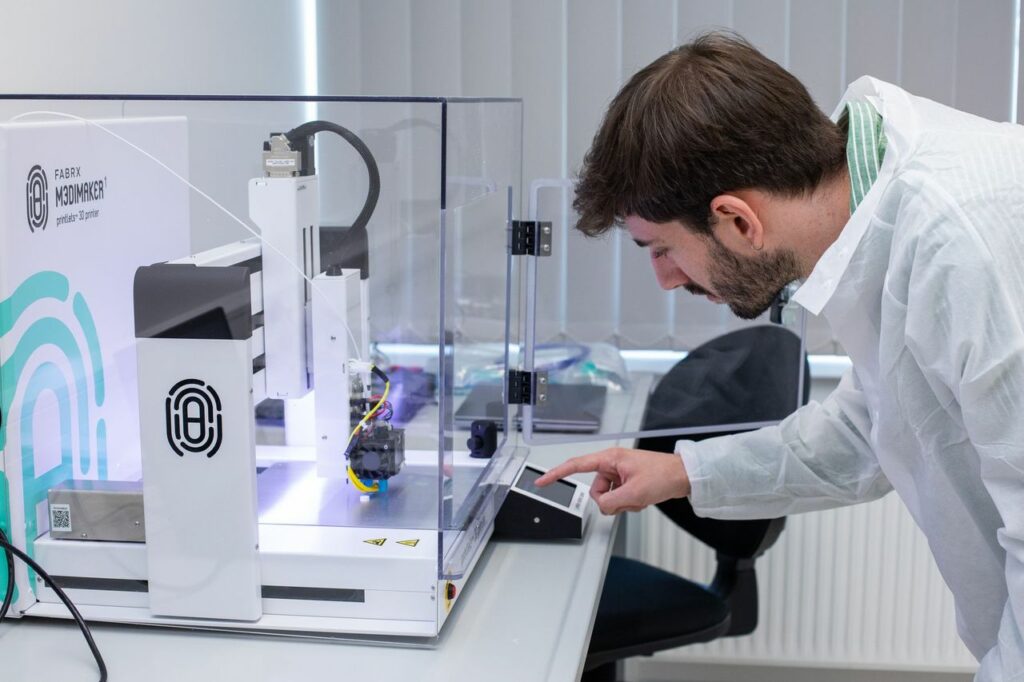
Studies at LSMU provide the foundations for a successful scientific career. The University is welcoming to curious, motivated and dedicated minds. Students are encouraged to propose interesting and unique research topics with scholarships offered by some Faculties. There are plenty of young people in the research laboratories. Talented, experienced and renowned figures in various fields of science at LSMU pass on their experience to PhD students, who often become promising researchers, discoverers, and inventors.
A unique validated three-dimensional (3D) drug printer has recently been acquired at LSMU, and not only Doctoral but also Master’s theses are being prepared on related topics.
It is no coincidence that the University’s new science and study centres feature student lecture halls and research laboratories right next door.
LSMU is distinguished by simulation-based teaching
One of the best-developed teaching methods at LSMU is medical simulation, where clinical practical skills and ways of dealing with situations are developed using mannequins, models, simulators, or conditions that mimic the patient’s environment, thus shortening the learning time and training specialists faster.
For example, the new building of the LSMU Faculty of Nursing features one of the pre-clinical skills simulation rooms where future nursing professionals learn to use modern nursing beds and various other equipment. There is also the occupational therapy area where students learn how to work in a simulated patient home environment. The physiotherapy skills training classes provide students with practical knowledge on how to make a diagnosis of physiotherapy, select tools and the appropriate techniques and methods. The Clinical Department of Sports Medicine uses the training mock-ups intended for the residents to learn how to administer drugs around the major joints, and has a simulator to learn practical auscultation skills.
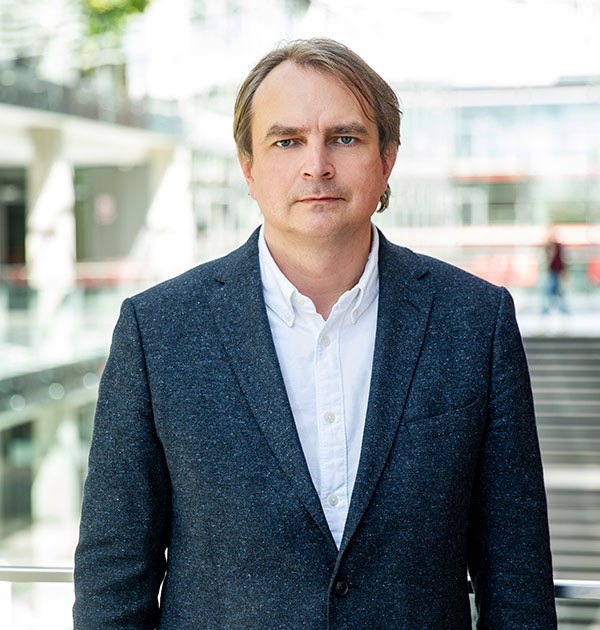
“Skills training helps students discover where they can do their best. This might be therapy, research, analytics or technology. The University provides the conditions and opportunities to choose”, says Prof. Kęstutis Petrikonis, LSMU Vice-Rector for Studies.
Other Faculties at LSMU also offer opportunities to acquire professional skills using simulation methods. The Medical Simulation Centre has been operating at LSMU for more than 10 years, and the Veterinary Medicine Simulation Centre for 5 years. Simulation training in various fields is provided in different parts of the pharmaceutical degree programme. A significant part of hybrid simulation training, in particular the training of the required professional skills, is well implemented with the help of HybridLab concepts, which have been introduced and developed by the LSMU Department of Emergency Medicine and its partners.
The LSMU Department of Ophtalmology is the first in the Baltic States to deploy a modern and sophisticated eye microsurgery skills training simulator. It provides an opportunity for young ophthalmologists considering becoming microsurgeons to safely and effectively learn and improve their skills in microsurgery.
Special spaces open up new opportunities for students
Nursing and rehabilitation students are currently learning in the recently opened new study and research facilities of the Faculty of Nursing. The building boasts exceptional quality and function: from its impressive interior design, comfortable and cosy teaching, study and relaxation spaces, ergonomic work areas, to the state-of-the-art technology-based equipment in the classrooms and research laboratories.
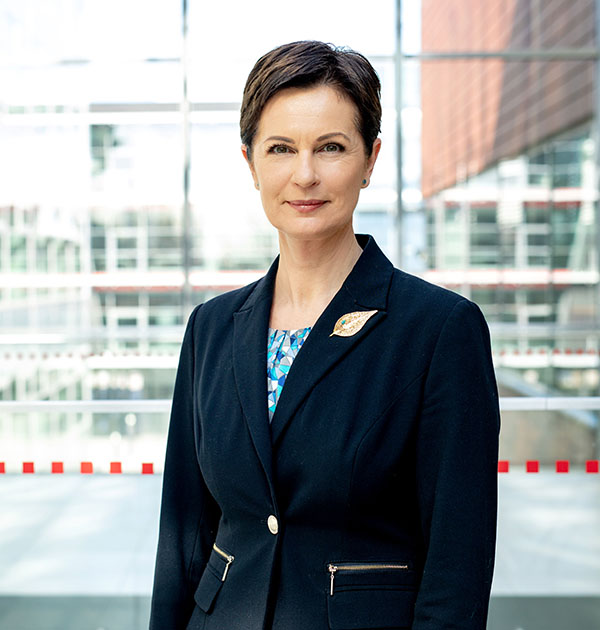
“The modern infrastructure provides excellent conditions for students to acquire practical and clinical skills, and will help researchers to engage in the highest level of research, develop new diagnostic and therapeutic methods, and modernise various technologies,” emphasised Prof. Jūratė Macijauskienė, Dean of the LSMU Faculty of Nursing.
The LSMU Wildlife Rescue Centre is already accepting patients, providing round-the-clock qualified assistance to injured, confiscated or care-needing wild animals from all over Lithuania. It houses a veterinary clinic with wildlife examination rooms, an operating theatre and a laboratory equipped with the latest diagnostic equipment. The Centre will help to train specialists with the specific knowledge needed in this field, and scientific activities are also planned.
Two more buildings have recently been built on the campus of Kaunas Clinics of the University Hospital, which are joint projects of major importance to LSMU and Kaunas Clinics. The Human Biological Resources Centre, also known as the BioBank, stores human biological samples and related information that could be used for biomedical research to develop new treatment and diagnostic methods, and to search for disease biomarkers.
The new Nuclear Medicine Research Centre with its cyclotron has already been visited by representatives of the European Organisation for Nuclear Research (CERN). It will develop nuclear medicine research and produce very short half-life medicines that are difficult or impossible to obtain from abroad, yet so much needed by patients. In the future, it is planned that LSMU PhD students will be able to carry out part of their research at CERN.
That means that interesting careers covering the latest trends in science can be built at the University as well.
Global recognition
LSMU graduates are highly rated by employers. According to surveys, 92.42% of employers have a positive opinion of the graduates’ professional readiness.
In addition, as of 2024, the LSMU Diploma of Medical Studies is recognized globally.
After the Centre for Quality Assessment in Higher Education (SKVC) received recognition from the World Federation for Medical Education (WFME) to assess the quality of medical studies and ensure quality monitoring of studies, the LSMU medical degree programme, accredited in accordance with the standards of this body, has global recognition as of 2024.
This means that medical doctors who have obtained a Master’s degree in health sciences and a qualification as a medical doctor in Lithuania can practice and apply for residency studies in the U.S., Canada, Australia, New Zealand and other countries outside the European Union, where accreditation and quality monitoring based on the standards of the WFME and/or the so-called American system of medical education are considered to be the standard for the quality of medical studies.
“This is a recognition that the Lithuanian medical education meets global standards. We are global players competing not only on a national, not only on a European, but also on a global scale,” said Prof. Dr. Kęstutis Petrikonis, LSMU Vice-Rector for Studies.
This year, LSMU will admit students to 17 first-cycle and integrated study programmes.
What makes LSMU special?
Today, a doctor or other healthcare professional is expected not only to possess excellent professional skills and knowledge, but also the ability to communicate, compassion, a holistic approach to health and the patient, the teaching and research competences, creativity, critical thinking, the ability to learn quickly, problem-solving and teamwork skills.
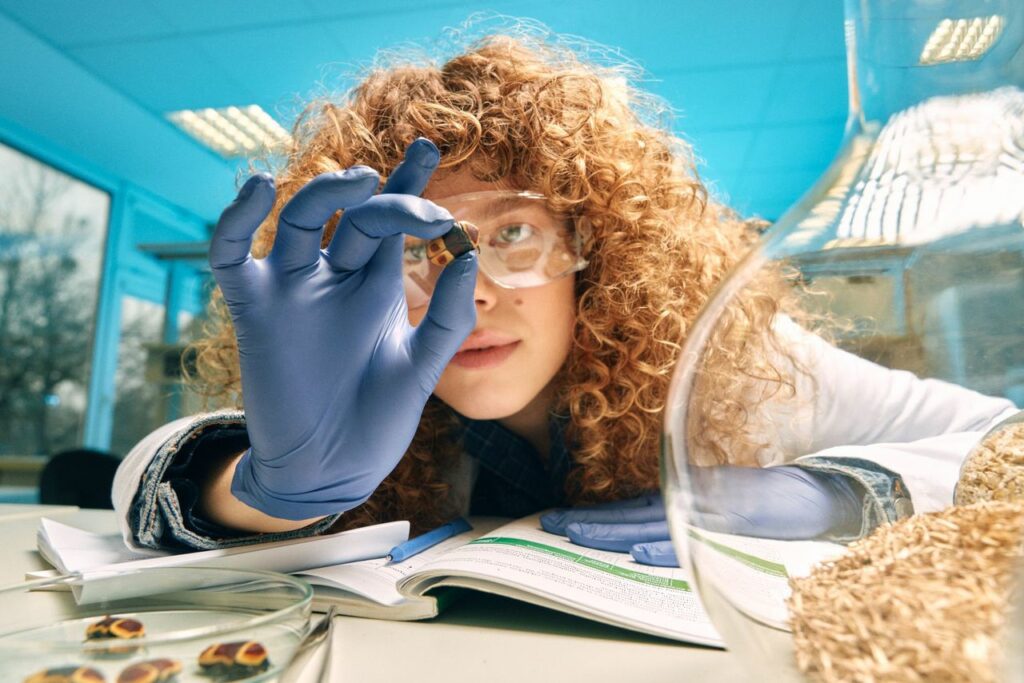
At the Lithuanian University of Health Sciences, these skills are developed in a comprehensive way, using unique teaching methods and solid practical training.
The method of integrated problem-based learning, unique in Lithuania and applied only at LSMU, developed together with researchers from the University of Geneva (Switzerland), cultivates clinical thinking, teaches problem-solving, and encourages students to look for their knowledge gaps to address.
Today, problem-based learning is applied to the following degree programmes: Medicine, Pharmacy, Public Health, Health Promotion and Rehabilitation, Occupational Therapy, Nursing, and Health Psychology.
Many hours of exercises, excellent teaching and practical training facilities, learning in cycles (modules), and the integrated problem-based learning method are the advantages of studies at LSMU, which are also often mentioned by students themselves.
Medical simulation centres provide safe training for future doctors, nurses, midwives, occupational therapists, physiotherapists, and veterinarians in therapeutic skills, communication, and teamwork.
LSMU is home to a unique and student-favourite innovation – HybridLabs, designed to practise practical skills until you can master and apply them without errors.
